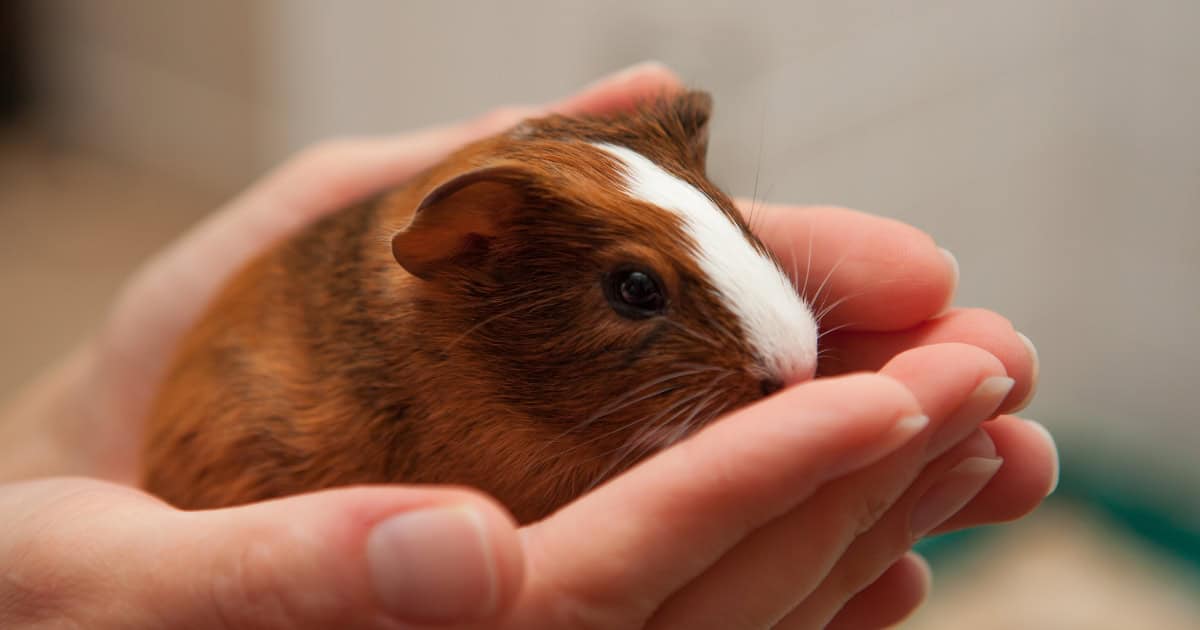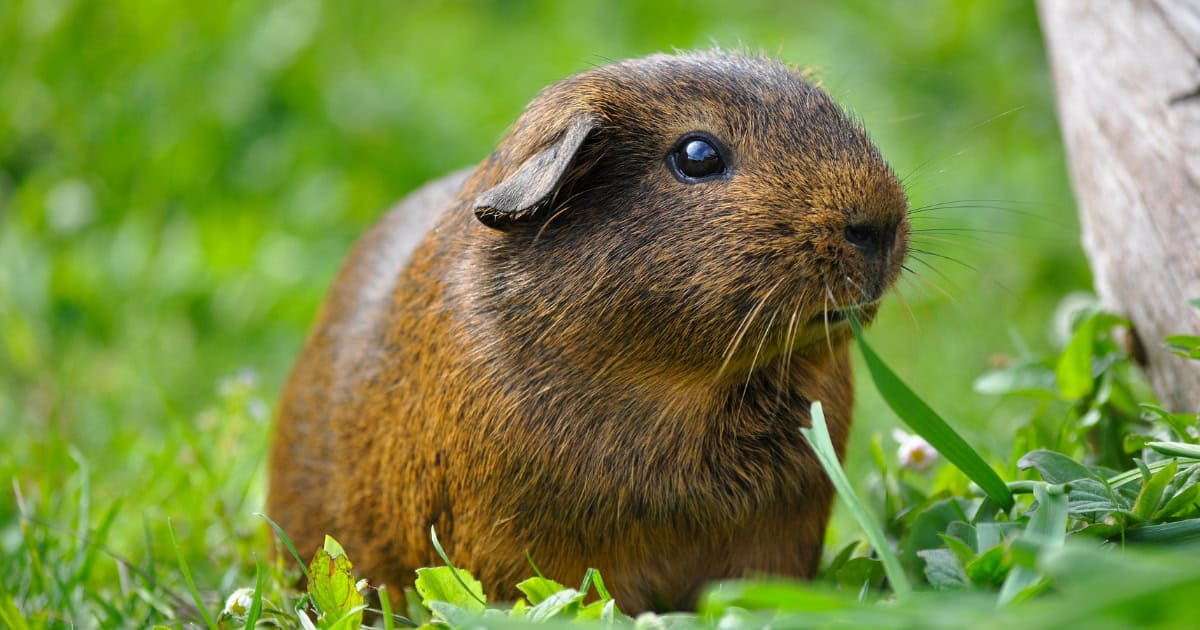Guinea Pigs
Guinea Pig Facts – Some Fun & Interesting Facts About Guinea Pigs You May Not Know
GUINEA PIGS
Guinea pigs are funny little creatures.
They can be very affectionate once they get to know and trust their owners.
They are a popular pet as who can resist how cute these little critters are! But do you know all there is to know about your guinea pig?
Below are some fun and interesting facts about guinea pigs you may not already know:
Did you know?
Other Names for Guinea Pigs
The other name for a guinea pig is ‘cavy’ which is the short version of their official name Cavia Porcellus.
Guinea pigs are not related to pigs and they do not come from Guinea.
The ‘Guinea’ in their name refers to the country of Guyana. ‘Pig’ refers to their stout bodies which give them a ‘piggy-like’ appearance.’
Rodent or Mammal?
Did you know that the Guinea pigs are rodents and are mammals.
They are a member of the Caviidae family, meaning that they are closely related to chinchillas, agoutis, coypus, porcupines and capybaras.
Guinea pigs are different to hamsters…
… Hamsters are smaller than guinea pigs, are omnivorous (meaning they eat both meat and vegetation), have a life expectancy of only 3 years and make a much quieter sound than the guinea pig.
Domestication
Guinea pigs were originally domesticated around 2000BC in the Andes, in Peru and Bolivia, being kept mainly for food.
Some children may have kept them as pets also.
They became more widespread as pets in the 16th century when Spanish explorers brought guinea pigs back with them from South America.
They then became pets for the elite and wealthy.
There are places in South America that still eat guinea pigs! Peru, Bolivia and Ecuador eat roasted guinea pig known as ‘cuy’.
There are some speciality restaurants in the United States of America that now also serve cuy.
Domesticated guinea pigs no longer exist in the wild. Other breeds do however, such as the Montane or Brazilian guinea pig.
The Guinea Pig Body
Guinea pigs are tailless rodents with stout bodies They do have tail vertebrae, but no tail.
They have 4 toes on their front feet but only 3 on their back ones.
Their front feet are sometimes used for grooming themselves, as well as walking on all 4 feet.
Guinea pigs have a total of 258 bones in their body.
Guinea pigs have 20 teeth including the visible 4 incisors at the front.
Guinea pigs can’t sweat like humans can and get heat stroke if they are left out in the sun or become too hot.
They love to sit in the shade whenever possible.

Life Span of a Guinea Pig
The life span of a guinea pig is between 5 – 8 years.
The better a guinea pig is looked after, the longer they will live.
Gender
Female guinea pigs are called ‘sows’. The males are referred to as ‘boars’.
Baby guinea pigs are called ‘pups’.
Sows are pregnant for 70 days.
Pups are born with fur and their eyes open.
They are able to run when they are only a few hours old.
What Guinea Pig Food is Best?
When it comes to diet, they are herbivores and mainly live on grass and hay.
The healthiest hay is Timothy Hay, which is low in fat and high in fibre.
Guinea pigs will enjoy foraging outside for grasses, clovers and dandelions.
Their teeth continue growing throughout their lives which is why it’s important for them to constantly gnaw, so that they wear their teeth down.
Because they are constantly gnawing, guinea pigs are sometimes known as ‘bottomless pits’.
Guinea pigs cannot naturally produce Vitamin C in their bodies, so you need to supplement their diets with this vitamin.
The best way to do this is by giving them Vitamin C enriched pellets, dark leafy greens and vegetables daily.
Vegetables guinea pigs love include spinach, parsley, capsicums, broccoli, corn (including the husks and silks) and carrot.
Vegetables should always be given fresh and raw, not cooked.
Only give your guinea pig fruit once or twice a week, as fruit is high in sugar and cause lead to obesity.
The best fruits for guinea pigs are apple, pear and strawberries (including the green tops).
They practise coprophagy which mean they eat their own poo!
They don’t eat all their poo, just a special soft pellet called cecotropes to consume nutrients they missed the first time around.
Guinea pigs cannot last longer than 8 hours without food.
Always ensure your pet guinea pig has plenty of fresh food and water.
Whilst constipation is rare in guinea pigs, it can happen. Symptoms include not finding many poos in the guinea pigs’ area, noticing your guinea pig straining to move his or her bowels and bloating.
If your guinea pig is showing symptoms of constipation, causes can be dehydration, a poor diet, intestinal blockage or anal impaction.
Always take your guinea pig to see a vet if this happens.
How Long Do Guinea Pigs Sleep?
Did you know that Guinea pigs don’t need to sleep for long periods?
Instead, they prefer to take short naps throughout the day and night.
Guinea pigs are active for about 20 hours per day and rest for short times only. They are very active during the day and less so at night.
Groups
Guinea pigs are sociable herd animals and should never be housed alone, as they can become lonely, stressed and depressed.
Symptoms include low energy and disinterest in food.
If you do only own one, make sure you keep your guinea pig company!
Set aside time for playing, cuddles and talk to your guinea pig regularly. Wooden chew toys also keep solo guinea pigs busy.
In Switzerland it is illegal to own just one guinea pig.

Abilities
Guinea pigs have good hearing which is more sensitive than human hearing.
They are incredibly sensitive to loud noises. This helps them to hear predators and have time to run away.
Their vision isn’t too good, with poor depth perception.
However, they can see almost all around them with the way their eyes are set (approx. 340 degrees of vision). Guinea pigs can see colour.
They are poor climbers but can run very quickly.
Guinea pigs are very intelligent.
They need variety in their diets and habitats to avoid boredom.
They have good spatial memory and can remember learned pathways to food sources for many months.
Guinea pigs can even be taught to use a litter box or do tricks.
Behaviour
Guinea pigs are naturally very timid. If frightened, they will often freeze or run away quickly.
They will rarely attack or bite if they feel threatened. Guinea pigs spend a lot of their time hiding.
Make sure you give your pet guinea pig plenty of places to hide.
What Noises Do Guinea Pigs Make?
They make lots of different noises when they want to express themselves.
This includes squealing, chirping, rumbling, purring and chirping. They will regularly make noises when anticipating food.
When they are happy, guinea pigs jump straight up and down in the air which is referred to as ‘popcorning’.
You’ll often see youngsters do this when they are playing or after their areas are cleaned out.
Guinea pigs love to spend their time grooming each other and themselves, making them very clean animals to keep as pets.
Celebrity Owners
Celebrity guinea pig owners include:
- Princess Diana Spencer
- American president Theodore Roosevelt
- actor Timothy Olyphant.
World Records
The oldest recorded guinea pig, Snowball, lived to the ripe old age of 15, which earned a place in the Guinness Book of Records.
The world record for longest guinea pig jump was by Truffles, who cleared a gap of 48cm in 2012.
The world’s fastest 10m by a guinea pig was achieved by Flash, who ran the distance in 8.81 seconds in 2009.
Did you know all these fun facts?
Please tell us which one was your favourite! Or let us know if you have some more fun facts.
SEE ALSO:
- The Ultimate Guide to Caring for Guinea Pigs
- Caring for your American Guinea Pig
- Guinea Pigs Hutches for Aussie Backyard





I love my piggies more than any other pet I’ve had. My f.b home page has a picture of my herd, billyzavistoski on f.b. I always read all the material about piggies whenever I can. Thank you for this article, even though I knew about everything author was talking about, new facts are always welcome, thank you again, sincerely billy z